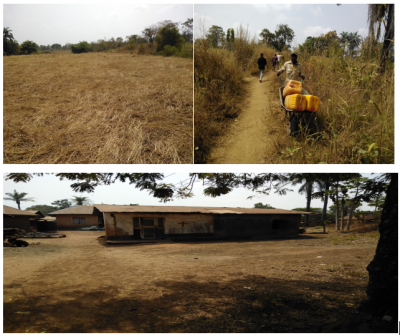COMMUNITIES RECOUNT RESILIENCE STRATEGY AROUND NATURAL RESOURCE RELATED CONFLICTS IN THE BENUE VALLEY

In recent years, Nigeria’s Benue State has attracted national and international attention due to violent conflicts between farmers and pastoralists, leading to loss of lives, livelihoods and disruption of the economy.
In 2018, the Benue State Emergency Management Agency (BENSEMA) estimated that 483,692 persons were displaced and living in IDP camps and host communities in safer areas within the same or neighboring LGAs across Benue State. Of this number 159,444 were children from 6-17 years comprising (85,626 males and 73,818 females) and 211,631 were adults from 18 years and above comprising (102,352 males and 109,276 females). Children 0-5 years constituted 112,617 of the total population.
As a way of finding out how communities are adopting coping strategies in the communities relating to the conflict over land and water resources, the TRANSMITTER embarked on an investigation in Mbalagh Community to interact with MR PETER ADINYA a community Leader, Peace and Security Dialogue Stakeholder, with vast knowledge from trainings he acquired from the United State Institute for Peace, an indigene of Mbalagh Council Ward of Makurdi Local Government.
Mr. Adinya told the TRANSMITTER that Mbalagh community made up of Ujukuior and Mbirawa districts with arable land and a source of water from river Shina located in Ujukuior Clan flowing all year round thus making it a fertile ground for herders to graze their cattle. Mbalagh community according to Mr. Mr. Adinya came under attack from the period of 2011 down to 2017. In 2018, the community has not been attacked and now enjoys relative peace.
Nevertheless, he said, the previous attacks left not less 400 hundred people dead while more than half of the council ward was destroyed with the primary school in Anter, the headquater of Mbalagh Council ward also destroyed.
Mr. Adinya opined that “we have adopted dialogue with herders as a strategy for forestalling the occurrence and reoccurrence of the conflict and further attacks.” On how the youth are involved in this approached, he stated unequivocally thus “youth involvement is through advocacy and constant counselling by elders against cattle rustling to avoid conflict.”
On rebuilding the community he said, members have been able to rebuild their homes, he stated that the community members use grasses and straws from the farm field for roof while most people use the remain of burnt roofing sheets to roof their houses.
However, to a community stakeholder and Youth leader of Tse Zwatema in Gwer West Local Area who would not want their names mentioned, told the TRANSMITTER that no house in their community of Tse Zwatema is standing as everything has been burnt down by the herders.
On how the community is coping with farming activities, Mr. Adinya said due to the loss of yam seedling as result of the protracted conflict, the people now resulted to farming mostly cereal crops like millet, maize, sorghum, melon, rice which they can easy purchase the seedlings from the local markets within.
A retired Teacher with Benue State Universal Basic Education Board (SUBEB) who simply identified himself as MR. Uchin in answering this question said “I am a pensioner as a retired teacher and now displaced from my Village in Ukpiam and now resident in Aga. I survive on my monthly pension which is not regularly paid to buy food and other needed items to cope with wife, children and support of family members outside Benue.”
On the educational need of children in the community in the post conflict, Mr Adinya said in Mbalagh Council ward the public primary school in the headquarter of the council ward Anter has been renovated; most parents took their children and enrolled them in schools in urban areas like Daudu.
For the women , girls and the youth he said, women have since gone back to their light farming and petty trading to support their families.
Some members of Mbalagh community, and Agan further corroborated the position of Mr. Adinya. Some of them have sourced for land from unaffected communities to farm. Some of are surviving and coping on the good will of dependents family members. Women engaged in wood selling and Petty trading to survive family members. Some of them engage in handwork and being labourers of menial jobs. At household level, sometimes they travel outside Benue state to work and send money to family members who are still in the state.
Another respondent, James Tyokaa Aondohemba living with disability, while Speaking to the TRANSMITTER said he is from Tse-Age, a neighbouring settlement in the boarders of Keana LGA and Guma but now taking refuge in Agan. He said “non of my children is in school at the moment.” James Tyokaa is a professional cobbler, he said the situation is now better though not perfect as he now has tent where he does his shoe business to put food on the table for his family. As at the time the TRANSMITTER visited his shop in Agan, James Tyokaa was seen attending to customers.
Cluster settlements in some communities are helping in protecting the lives of members of resettled communities through adequate vigilance and surveillance. This has helped in reducing fear of isolation.
It appears the end of the crisis is not in sight. Most communities are still under occupation by the herders and they are forced to move to IDP camps with worsening humanitarian needs, occasioned by the continuous farmers and herders conflict in the state which dates back to 2009 and 2020.



